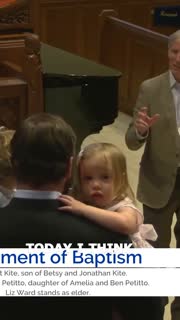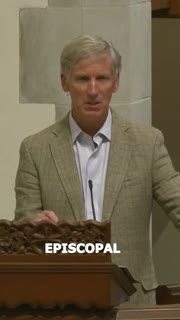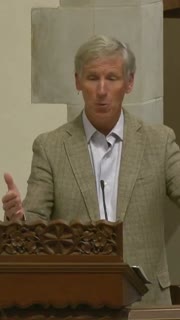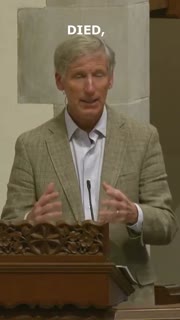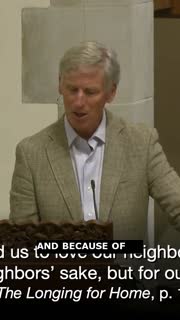Embracing Self-Giving Love Through the Cross
Devotional
Sermon Summary
Bible Study Guide
Sermon Clips
### Quotes for outreach
1. "Today I think we have a marvelous opportunity to recognize something about the nature and character of God and the nature and character of faith when it comes to baptism. And it is this, that God's love is particular and it is expansive. It is individual but it is also universal. And so today we claim that God claims and knows your children by name. That God loves your children and that God cares for your children and God will be faithful to your children. And that God loves all people." [23:02] (32 seconds)
2. "If you allow the noise of children to be heard in church, the noise of the church will be heard in children. And that's just a really good reminder and we are delighted to be able to have you." [24:02] (8 seconds)
3. "If you want to live, really live life, you have to learn how to give your life away. You have to learn how to die to self. And then Jesus makes this haunting statement. And I, when I am lifted up from the earth, will draw all people to myself." [37:09] (19 seconds)
4. "He died to show us how to live, to save us from our sins, to show God's love and forgiveness and reconciling power that covers, pays for, redeems everything we have done to separate ourselves from God and from, one another. But more than that, he died to save our souls from narrowness, from the confines of our own selfishness." [48:19] (25 seconds)
5. "And I, when I am lifted up from the earth, will draw all people to myself. All thanks be to God. Amen." [01:05:05] (60 seconds)
### Quotes for members
1. "So all the great stories in the world, the ones that grip us most deeply, saving Private Ryan, Jean Valjean, and Les Mis, Gandalf, and Lord of the Rings, center on someone who is willing to sacrifice his or her own life for the life of someone else. I was struck. I was struck by this again during the recent ESPY Awards, which featured Pat Tillman, whom you likely know, gave up his very successful NFL career, enrolled in the military, and died for a cause he believed in. So something deep within us knows that the story of self-sacrifice is at the very center of human history." [35:18] (46 seconds)
2. "Episcopal priest Fleming Rutledge, who preached here not so long ago, suggests that the story of Jesus, Jesus' death on a Roman cross, is precisely that. It's a story. It's not a formula, not an ideology, not a symbol, but a 2,000-year-old story whose grip on the human imagination is compelling, even to this day." [36:20] (24 seconds)
3. "He died because in Dietrich Bonhoeffer's memorable phrase, he was a man for others. So he died for his people who were poor. They were oppressed by the Roman government. They were persecuted. They were trampled. He identified with them, and therefore with all the nobodies of the world who are not in control of their destinies, the homeless, the weak, the powerless." [43:37] (26 seconds)
4. "He died, I believe, to show us how to live well in a world like that and to call us out of our selfishness and self-absorption, to show us how to live by loving passionately, by caring deeply, by giving our love and our resources to others and to causes that matter." [45:19] (18 seconds)
5. "And because of that God's love, there is always life right in the middle of death. And that is an important word, a very important word, that God's sacrificial love, brings life right into the midst of death." [45:19] (20 seconds)
Ask a question about this sermon
1. "Today I think we have a marvelous opportunity to recognize something about the nature and character of God and the nature and character of faith when it comes to baptism. And it is this, that God's love is particular and it is expansive. It is individual but it is also universal. And so today we claim that God claims and knows your children by name. That God loves your children and that God cares for your children and God will be faithful to your children. And that God loves all people." [23:02] (32 seconds)
2. "If you allow the noise of children to be heard in church, the noise of the church will be heard in children. And that's just a really good reminder and we are delighted to be able to have you." [24:02] (8 seconds)
3. "If you want to live, really live life, you have to learn how to give your life away. You have to learn how to die to self. And then Jesus makes this haunting statement. And I, when I am lifted up from the earth, will draw all people to myself." [37:09] (19 seconds)
4. "He died to show us how to live, to save us from our sins, to show God's love and forgiveness and reconciling power that covers, pays for, redeems everything we have done to separate ourselves from God and from, one another. But more than that, he died to save our souls from narrowness, from the confines of our own selfishness." [48:19] (25 seconds)
5. "And I, when I am lifted up from the earth, will draw all people to myself. All thanks be to God. Amen." [01:05:05] (60 seconds)
### Quotes for members
1. "So all the great stories in the world, the ones that grip us most deeply, saving Private Ryan, Jean Valjean, and Les Mis, Gandalf, and Lord of the Rings, center on someone who is willing to sacrifice his or her own life for the life of someone else. I was struck. I was struck by this again during the recent ESPY Awards, which featured Pat Tillman, whom you likely know, gave up his very successful NFL career, enrolled in the military, and died for a cause he believed in. So something deep within us knows that the story of self-sacrifice is at the very center of human history." [35:18] (46 seconds)
2. "Episcopal priest Fleming Rutledge, who preached here not so long ago, suggests that the story of Jesus, Jesus' death on a Roman cross, is precisely that. It's a story. It's not a formula, not an ideology, not a symbol, but a 2,000-year-old story whose grip on the human imagination is compelling, even to this day." [36:20] (24 seconds)
3. "He died because in Dietrich Bonhoeffer's memorable phrase, he was a man for others. So he died for his people who were poor. They were oppressed by the Roman government. They were persecuted. They were trampled. He identified with them, and therefore with all the nobodies of the world who are not in control of their destinies, the homeless, the weak, the powerless." [43:37] (26 seconds)
4. "He died, I believe, to show us how to live well in a world like that and to call us out of our selfishness and self-absorption, to show us how to live by loving passionately, by caring deeply, by giving our love and our resources to others and to causes that matter." [45:19] (18 seconds)
5. "And because of that God's love, there is always life right in the middle of death. And that is an important word, a very important word, that God's sacrificial love, brings life right into the midst of death." [45:19] (20 seconds)
